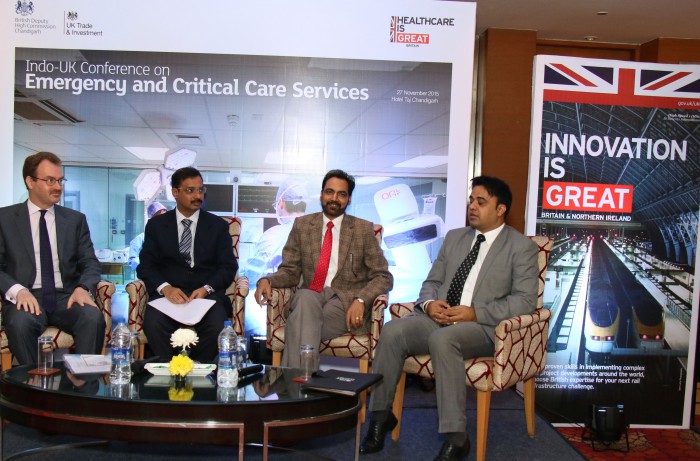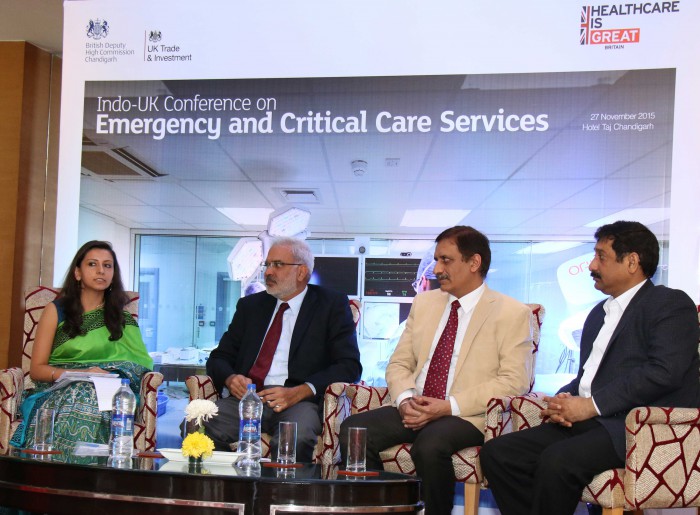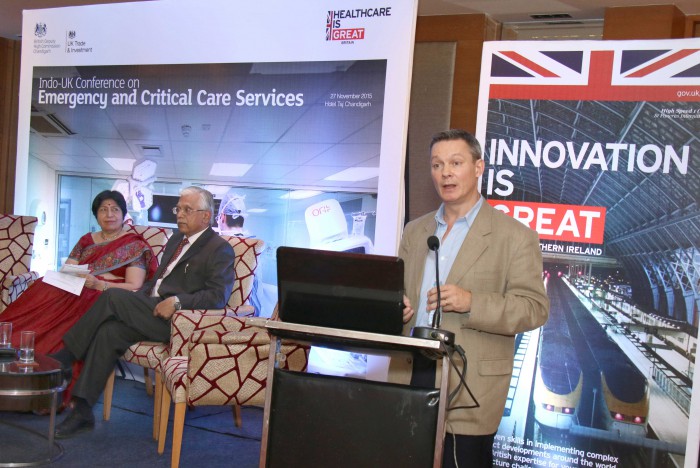7th January 2016 Delhi, India
Indo-UK Conference on Emergency & Critical Care Services
The British Deputy High Commission Chandigarh organised an Indo-UK Conference on Emergency & Critical Care Services on 27th November 2015.
UK-India collaboration in health
Both India and the UK are now focussing on working together on healthcare and the main objectives of the conference were: 1) to allow UK and Indian organisations to explore the scope for collaboration in pre-hospital care & ambulance services, and trauma, emergency & critical care; 2) to understand the opportunity in the public/ private sectors in North India in these sectors; 3) to create links between industry-academia, research and medical fraternity; and 4) to present case studies on innovations from both UK and India to enable shared learning.
The UK’s National Health Service (NHS) is the world’s largest integrated health system and a model to which governments and healthcare organisations across the world, including India, turn. The UK too wants to learn from India’s vast experience and undertake joint research work to improve healthcare services for larger benefit. During his welcome remarks, David Lelliott OBE, British Deputy High Commissioner Chandigarh rightly remarked that India’s doctors and nurses have made a valuable contribution to the UK’s healthcare services, and the UK’s NHS and its private healthcare system have a strong desire to share their experiences and to learn from the innovations and practices in other countries.
The conference highlighted four strong areas of the UK healthcare sector- paediatric and child health, capacity building and infrastructure, training of nurses and paramedical staff, and ambulance services. Experts from India and UK including giants like Royal College of Paediatric and Child Health, PGIMER Chandigarh, AIIMS Rishikesh, Health Education England, Global Health Exchange, Fortis Mohali, National Institute of Nursing Education and many more attended.
Better care for children
This topic sparked a valuable discussion. With respect to emergency and critical care, the Government of Punjab is providing free care for the first 24 hours especially to all girl children aged 5 years and below. They are also keen to reduce the infant mortality rate. Dr Sebastian Taylor, Global Head Operations for Royal College of Paediatric and Child Health (RCPCH ) highlighted the seriousness of Infant Mortality Rate and how its underreporting is keeping under wraps the poor preparedness of emergency departments to deal with paediatric emergencies. Dr Sunit Singhi, Immediate Former Head of the Paediatric Department at PGI highlighted the need to define and determine standards of emergency care for children which should be pragmatic. The community should be educated on accessing emergency care in time but it should also be available through entire chain, including pre-hospital care, emergency referral and transport. Dr Sebastian informed the gathering that one third of all neonatal death occurred in first 24 hours, hence India needs time sensitive interventions in a facility based setting. He also informed the gathering that RCPCH would be keen to work with India in improving its neonatal health statistics and the emergency triage process and procedures.
More capacity – including for the public and paramedics
Dr Arun Kochhar, heading the emergency department of Fortis hospital shared the initiatives they have taken including the training of police personnel in different districts of Punjab. Dr Kochhar also emphasised the importance of community participation. Since most emergencies happen at home or public places, improvement in community awareness regarding the basics of CPR can go a long way in preventing such deaths. Dr Sameer Aggarwal, Incharge of Trauma Centre at PGIMER, highlighted that in India, road traffic accident is the sixth leading cause of death with young people most affected. PGIMER experiences extremely heavy patient walk-in load and would be happy to see capacity being built in other hospitals so that overall structure of emergency care is strengthened.
While talking about capacity building and training, Dr Rajan Madhok from the Global Head Exchange spoke about circular migration of health personnel, so that skills and knowledge can be shared. He proposed that curriculum developed in one country should be used in another to create global students. GHE is working to create opportunities for global education and training for NHS staff, develop collaborative international projects to address current workforce shortages, help build health education capacity in LMIC and promote general overseas volunteering.
Dr Arvind Rajwanshi, Professor In-charge, National Institute of Paramedical Sciences, PGIMER, Chandigarh spoke about the lack of standardization across paramedical education particularly in teaching advances in skills and technologies. There is considerable lack of clarity as to what constitutes a paramedical, paraprofessional or allied health service and a strong need for a central regulatory authority for allied health professionals and courses in India. Authorities should carefully project the need of paramedical staff so that there is no availability gap in the education/training capacity for various specialties. He recommended that India develops protocols for undertaking education in new, cutting-edge courses and disciplines for which demand may be limited. A point raised by one and all was career planning for nursing and paramedical staff, as this will not only motivate them, improve their efficiency but also address issues of recruitment rules, cadre structures, remunerations, promotions and continuous education.
More ambulance services
The Government of Haryana has been providing free transportation to newborns and pregnant mothers and roadside accident victims. Unlike other states, Haryana runs its own ambulance services and would welcome UK experience in improving its efficiency and effectiveness. Dr Rahul Singh Sardar and Dr Shalini Nalwad, both Air Ambulance service experts from UK, are in the process of launching an air ambulance service in India. They plan to import the skills, experience, and logistic systems and introduce gold standards for care in collaboration with AirMed UK. The main aim of this is to streamline and standardise the aero medical field to develop specialist transfer teams. They have been motivated by the dismal scene of air ambulance services in India and would like to work with state governments in developing strong ambulance service in India, based on their experience of working with Helicopter Emergency Medical Services (HEMS), UK.
More support to excellence in nursing
Dr Suresh Sharma, Principal, Nursing College, AIIMS Rishikesh brought to light that India’s focus remained on quantity not quality of nurses. Most graduating nurses lack basic as well as advanced level nursing skills. India is producing nurse educators but not advanced nursing specialists. In the Northern states of India, nursing is not yet considered as the primary choice of the students and if they join, they either plan to leave for aboard or work as a nursing teacher rather than a bedside nurse. The situation is aggravated as the nursing faculty also lack the clinical competencies and thus emphasise only theoretical content.
Health Education England and the UK as a whole has done commendable work in this segment and it was extremely helpful that Dr Lisa Bayliss-Pratt, Director Nursing was one of the panellists. Health Education England is working to develop training hubs across England. These enable groups of GP practices to offer inter-professional training to primary care staff, extending the skills base and developing a workforce which can meet the challenge of new ways of working. Dr Pratt highlighted that even UK had to rework its structure to get to where they are now. Following the Mid Staffordshire Foundation Trust public inquiry report, which made a range of recommendations affecting nurses and nursing, the capacity for front-line nursing leadership needs to be increased by enhancing the role, offering better support and professional development resources, placing leaders at the centre of teams caring for patients, and identifying nurses with personal responsibility for each patient.
 Dr Sandhya Ghai, Principal, National Institute for Nursing Education also stressed that the status of nurses needs to be uplifted and that the standards required for the delivery of excellent nursing care should be recognised and incentivised in the remuneration structure by more explicit reference to the delivery of excellent care, and by use of professionally formulated and accepted performance measures. The specialist skills, commitment and compassion needed for the nursing care of the elderly should be accorded the recognition they deserve by creation of a specialist registered status.
Dr Sandhya Ghai, Principal, National Institute for Nursing Education also stressed that the status of nurses needs to be uplifted and that the standards required for the delivery of excellent nursing care should be recognised and incentivised in the remuneration structure by more explicit reference to the delivery of excellent care, and by use of professionally formulated and accepted performance measures. The specialist skills, commitment and compassion needed for the nursing care of the elderly should be accorded the recognition they deserve by creation of a specialist registered status.
This conference was a much needed and eagerly accepted start of fruitful collaborative work between India and UK to jointly work to improve the efficiency of emergency and critical services within this region.
